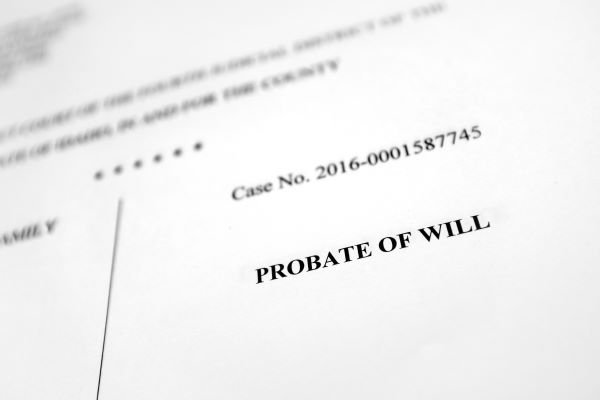Voice, especially, is deeply tied to memory and emotion. By incorporating an AI voice model into estate plans, individuals are leaving behind not just a record of their existence, but a sensory, profoundly personal experience of their presence.

What Probate is All About
Even though probate carries a stigma of having a bad reputation, thoughtful estate planning can minimize or avoid it. In reality, most heirs will have to navigate the probate process to some degree after losing a loved one. Understanding what probate is in conjunction with careful estate planning can minimize probate’s impact on an estate’s value and inheritors’ well-being.
What is Probate?
The probate process is a series of court-supervised proceedings in which the decedent’s assets become retitled and distributed to the named heirs. It also includes validating the decedent’s will, ensuring payments of the estate’s debts and taxes, and enacting any minor children’s guardianships. In addition, heirs, other interested parties, and creditors have the right to contest the will in probate court.
The probate process is generally efficient in smaller estates but can become lengthy and complex in larger ones. States have varying probate codes, and many have informal and formal probate processes. The informal process occurs when there is no expectation of a contest to the estate. Typically the administration of the estate includes the personal representative or executor, beneficiaries, creditors, and a judge.
Probate becomes necessary to manage and transfer those properties and assets of an estate that are not via contract law, trust law, or state titling. Any property or assets in the decedent’s will or those owned by an individual without a will (intestate) may necessitate probate. Property and assets not awarded in the will or otherwise transferred become part of the probate process in addition to the property and assets awarded to heirs with a need for retitling. State intestacy laws determine the dispersal of probate property in an estate without a will or beneficiary designations.
Which Property and Assets Aren’t Subject to Probate Court?
Some property and assets are disbursed outside of probate, including:
- Property held in joint tenancy with rights of survivorship
- Property held as tenancy by the entirety
- All trust property
- Retirement funds with named beneficiaries
- Life insurance policies with named beneficiaries
- Annuities with named beneficiaries
- Transfer-on-death (TOD for securities) accounts
- Pay-on-death (POD for cash) accounts
What Happens in Probate?
The first step in probate is producing and validating the will. It is also useful to contact family members and other heirs at the onset of the probate process. Involving known heirs provides information about who accepts the state of the will or whether it will be contested. Without objection, an estate planning attorney can prepare the probate documents, have distributees sign and notarize consent forms, and file the probate documents with the court. Probate proceedings may occur in the physical court setting or virtually. Routine probate hearings often occur on video platforms such as Zoom, streamlining the process and creating convenience for the court, attorneys, and clients. Virtual probate hearings are also more cost-effective for clients.
The probate petitioner, usually the estate’s personal representative, will file the necessary documents with the court for the first probate hearing. These documents include a certified copy of the death certificate, the decedent’s last will, a list with the names and addresses of the decedent’s heirs, and a known list of creditors.
How Long is the Probate Process?
An informal probate process can conclude in as little as six to eight months. An estate with complex assets, contests to the will, or both may experience a complicated probate process that is extensive, expensive, and may take multiple years to conclude. These lengthy probates are frustrating for deserving and rightful beneficiaries who must wait for the probate court’s conclusive legal findings regarding the estate, property, and asset distribution.
Is Probate Expensive?
Aside from the length of time, the probate process can also become very expensive. According to a US News article, the average probate process costs for legal fees and administration is five to ten percent of the estate. Some estates with complex or lengthy probates may lose twenty or more percent. Many states have attorney fee schedules that reflect the estate’s size and location. In addition to an estate’s lawyer fees, there may also be executor compensation, court filing, and other paperwork fees. The possibility of a probate bond can also increase the cost of probate.
The most common reason for increasing probate costs is litigation among beneficiaries or non-heirs trying to receive ownership of the estate’s property. Additionally, if the decedent was a party in litigation at the time of death and the estate is the successor in interest, the ongoing litigation can get very expensive. Costs may also rise relating to preparing and filing federal and possibly state estate tax returns and any accompanying audits.
What are Common Reasons to Avoid Probate?
Besides trying to avoid high costs and time-consuming probate administration, many people prefer to avoid making the terms of their will a public record. While a substantial portion of the estate can remain private through designated beneficiaries and rights of survivorship accounts, to avoid having the bulk of an estate’s assets become public knowledge, most people with larger estates seek privacy by creating appropriate estate trusts. An estate planning attorney can identify which trust type will most benefit your goals as you plan for your legacy.
Contact our office if you want to learn how you can avoid probate or get through the process as seamlessly as possible. Thoughtful planning, asset coordination, and regular review of your estate plan can minimize the potential that your heirs will experience an extensive probate process. At a time when your loved ones are mourning your loss, you can protect them through careful estate planning. For assistance, please contact us at 914-498-8709 and schedule a consultation.